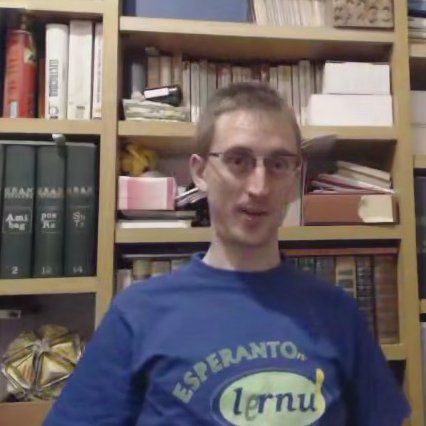How has Esperanto entered into my daily life

I learnt Esperanto in 2004, when I was 19, by reading an Internet course and a small novel for three months, and months later I practiced it by writing some technical articles and reading some books. The first time I spoke it with more people, I was already fluent! Esperanto is a special language that has given me much and it has improved my way of learning.
This is what it taught me:
- it introduced me to the grammar of more complex languages like German/Russian/Greek/… but in a simple way. For instance, my native languages Spanish/Catalan don't use the concept of grammatical case (words change according to their role in a sentence) and when I was young I didn't understand it. Esperanto uses it through a simple rule (always add
-nto the object of the verb). With this knowledge, understanding the same topic in German was much easier - it helped me to learn other languages faster. Sometimes because of similar words (e.g.
hundo=der Hund(German) = dog), but mostly because now I recognize the patterns we can use to adapt words to our needs. Examples of word transformations you'll find in many languages (including Esperanto): you can create the polar opposite of a word (mal-), apply an action over other-ig-or over self-iĝ-, add semantic suffixes (a collection of:-ar-; a tool:-il-; a person:-ul-; a thing:-aĵ-; an element:-er-, …), you can use a word in any form you need (as a noun:-o; verb:-i; order:-u; adjective:-a; adverb:-e). When I study a new language, I describe it in comparison to Esperanto's grammar, which is simpler - it allowed me to play with words, which is something I like. In German it was quite the opposite: I invented a new word and someone said I understand what you mean… But no-one says it that way. You can't use that word. In Esperanto, you build words from pieces, like in a construction game, and as long as you don't break the basic grammar rules, you're allowed to be creative and everyone is prepared to understand the words. E.g. when I didn't know how to say vocal folds I said
voĉilo(voĉo+-il-: voice-tool). - I met many interesting people through it. Remember that no-one forces you to learn Esperanto, so people who learn it are people interested in the world and in communication, and who'll certainly like to speak and discuss about it. Through this self-selection, meeting Esperantists fosters interesting conversations
- it has definitely opened new possibilities. I have been hosted by Esperantists through hospitality services (Pasporta Servo and CouchSurfing), just because of Esperanto. I have given Esperanto workshops and taught students. I went to conferences about different topics, in Esperanto. It's an additional channel for connecting people
- I also prefer it for personal use, e.g. I take many of my notes in Esperanto, because it encourages describing and defining the new things I'm talking about
In addition:
- I could get much more value from it in the future if I actively looked for resources, communities, events, festivals, nearby speakers, etc., something I tried only few times. I just learnt Esperanto for my own curiosity, but luckily there are many others who did the same, and when we randomly meet we speak together. Nowadays in Internet you can connect to communities much faster
- I still didn't mention the humanitarian and philosophical parts: Esperanto is a symbol of uniting the whole world and easing the dialogue without replacing our main identities, and the fact that it's not very prevailing tells us much about how short-sighted we humans are: few think
big-picturebig-planet about global communication, and no wonder we're also incapable of caring about our planet's biological ecosystem. Esperanto should make us remember this idea of unity. Voluntary unity in neutrality, with no conquests. Ironically, speaking the same language won't bring peace but at least it reinforces ideas like: speak and listen, think global, respect cultural identities, be friends
So, how to learn?:
- e.g. with Lernu (large community with resources, forums, courses, etc.)
- or Duolingo courses (with gamification, mobile apps, etc.)
- and any other you find
- dictionary: Reta vortaro. Or get a pocket one
- and I created a 2-sheet (4-page) grammar that you can print, Esperanto en 4 páginas (more info/languages).

Ĝis!
m5.2017 Daniel Clemente Laboreo (contact)